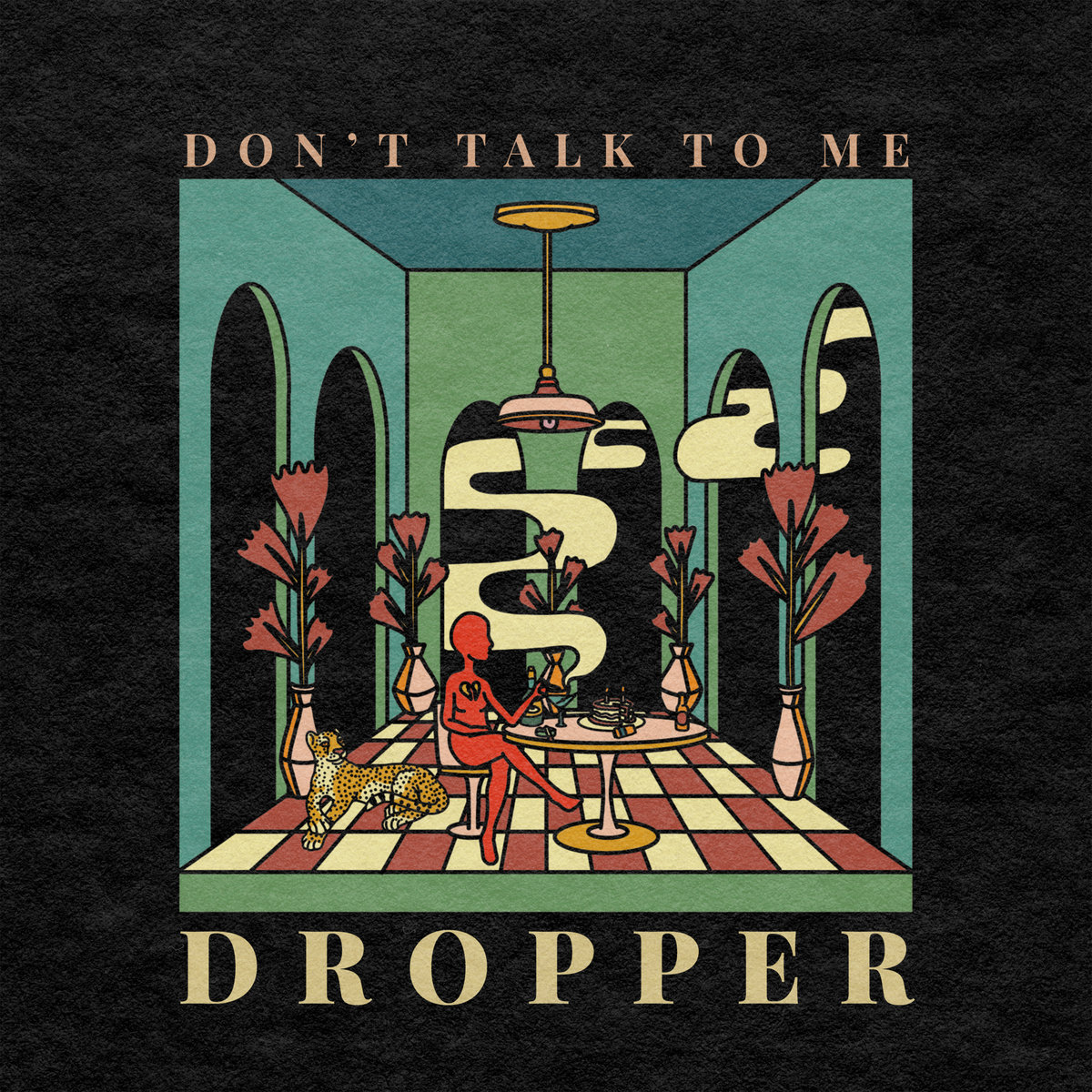Don’t Talk To Me, the debut album from Brooklyn outfit Dropper, has a wide range of folks it is aimed at. The band say the record is for everyone; from those mid-20s people who have had years of working in the service industry crush their soul, to those who are caught in a headspace of being “lonely yet want to be left alone.” People caught in all sorts of conflicted existential states: “Optimistic pessimists… But overwhelmingly for people who, in lieu of being crushed by the eternal weight of existence, choose to scream internally with a smile upon their face.” For anyone with a misanthropic bone in their body or who has been worn down by the relentless sense of everyday existence, this album’s for you.
Along with that tone being evident in the album’s title, it’s strewn across the nine songs within too. Multi-instrumentalist and brainchild of the band Andrea Scanniello narrates her exhausting existence, detailing everything from parental disappointment (“Waste of Time”) to melancholic despair at the bottom of a bottle (“Two Dollar Beer”). Her voice is the perfect tone for her words, a near deadpan assertiveness that lifts when the choruses arrive, like she’s walking away from a disagreement with a snarky remark. “Don’t worry / Don’t need your pity cause I do it to myself,” she chirps on “Don’t Worry”, like she’s hurrying along an awkwardly direct conversation.
Backed by her bandmates – Jono Bernstein, Yukary Morishima, and Larry Scanniello – her words are given both invigorating energy and downtrodden landscapes to tread through. “Don’t Worry” has an infectious energy that’s helped along by zesty, bright keys, while the swaying rhythm on “Waste of Time” is punctuated by fuzzy guitar licks. “Better” trudges through noir-ish gloomy atmospheres, bringing the mood down even lower and cementing the pace of the record for what feels like longer than the five-minute runtime.
Even when the band hit a stride, there’s still a sense that they don’t quite know what to do with it. A lot of the songs here feel on the cusp of a moment of brilliance, whereas the aforementioned tracks struggle to find satisfying moments to end; “Don’t Worry” burns its energy in out with an outro that simply slows down to a stop whereas “Ok Ok Ok” doesn’t quite know where to go. Like a few other numbers here, it might have benefited from a snappier arrangement and being more concise. Even when “Signal” takes a turn into what sounds like a different song in the final minute, it still feels a little odd and aimless, despite it being a moment of unexpected inventiveness.
Nonetheless, Scanniello and her band still find moments that make the whole bringing together of the ensemble definitely worth it. Album highlight “Memoirs of Working in a Bowling Alley” boasts a preppy swagger (moved along with a delectable syrupy bass) and encapsulates the mood of the album in a concise and thoroughly enjoyable three minutes; it’s easy to relate to for anyone burned out by tedious customer-facing work and life’s surrounding social obligations. There’s even room for a jagged guitar solo that rips through the noise like a serrated blade through a tedious instruction manual.
In Scanniello’s tales of the exhaustion that comes from working menial jobs to stay afloat in the New York scene, she occasionally hits on a gold nugget of wisdom. “When everybody feels the same / It’s hard for things to ever change,” she observes almost nonchalantly at one point. Elsewhere on the rain-soaked and elegiac final song “Telephone”, she lets go of a toxic love interest that doesn’t serve her own interests and desires: “I’m distracted and you’re a fire / I want someone to love / Not someone I admire / but you steal from me / Take all my energy.”
Maybe it’s the tracklisting that feels a little jumbled, leaving high points to stick out all the more – or perhaps it’s the missing jolt of electricity that could invigorate these tracks into life and one’s memory, but as strong as the elements of Don’t Talk To Me are, they don’t quite fit together perfectly. As Scanniello concludes on “Waste of Time”: “I guess I’ll take it” (also, it really should have been the record’s final track, the driving-into-the-distance fade out and message of acceptance of one’s fate a perfect sendoff of the album’s themes). It’s a reasonable start for Dropper, but at least with an album with such a range of people in mind, it’ll definitely connect with a few of the intended targets. Here’s hoping they aren’t too exhausted by life to take the time to listen.

